If the name “Trotsky” barely rings a bell, blame Stalin. Trotsky was a major player in Russia’s 1905 Revolution, 1917’s October Revolution, and on, a lifelong agitator for permanent, worldwide social revolution, Marxist political theorist, journalist and war correspondent. In his day, the Trotsky name was as recognized as Lenin’s. Leon Trotsky never stopped advocating for the working class … from prison, from exile, wherever he landed. He accumulated quite the extensive resume.
Of course, when Stalin gained power and proved to be a fascist, Trotsky opposed him vehemently. Yet despite all of Trotsky’s many books and voluminous writings condemning totalitarianism, Joseph Stalin succeeded in 1940 (his second attempt) in assassinating one of Russia’s most brilliant intellectuals and almost erasing him, and his unique brand of Marxist- and Leninist-inspired political ideology, called “Trotskyism,” from history.
But not completely. I know Trotsky’s name from my Polish, Holocaust-survivor father. As the eldest of four brothers (and keeper of the faith), he often referred disparagingly to younger siblings who’d run off to join “godless Trotskyists and Zionists.” Only now did I discover that Leon Trotsky was Jewish as well. His birth name was Lev Davidovich Bronstein, and his parents were wealthy Jewish colonist farmers in what’s today part of Ukraine.
I can see why playwright Andy Boyd – quite the consciousness-raising agitator in her own right – might have decided to name the protagonist of her recent play, “Lev.” Boyd’s THREE SCENES IN THE LIFE OF A TROTSKYIST had its world premiere at The Tank in NYC in 2024 and we can now see this innovative, suddenly timely, extremely intelligent yet also funny, moving, and thought-provoking history-and-literary-lesson of a play in Miami Lakes!
Yes, this play is ALL OF THE ABOVE … but mostly great fun! I’m warning you though: you must pay careful attention to not miss a beat! “Three Scenes” opens LakehouseRanchDotPNG’s fourth season, its second at Main Street Players. The company soon established itself as a welcome, professional stage for new, absurdist, and experimental theater in South Florida.
Co-founders Brandon Urrutia’s (artistic director) and Indy Sulliero’s (artistic associate) curated selections have a lot more going for them than the random off-off-Broadway shows I remember from my old New York City days. In fact, Brandon Urrutia, who did a fantastic job directing the fast-paced scenes in Boyd’s play (though I must add he had an exceptional cast to work with), just informed us at Sunday’s matinee that his company is now adding “politics” to their play subject list. They certainly made an impressive start with our afternoon show.
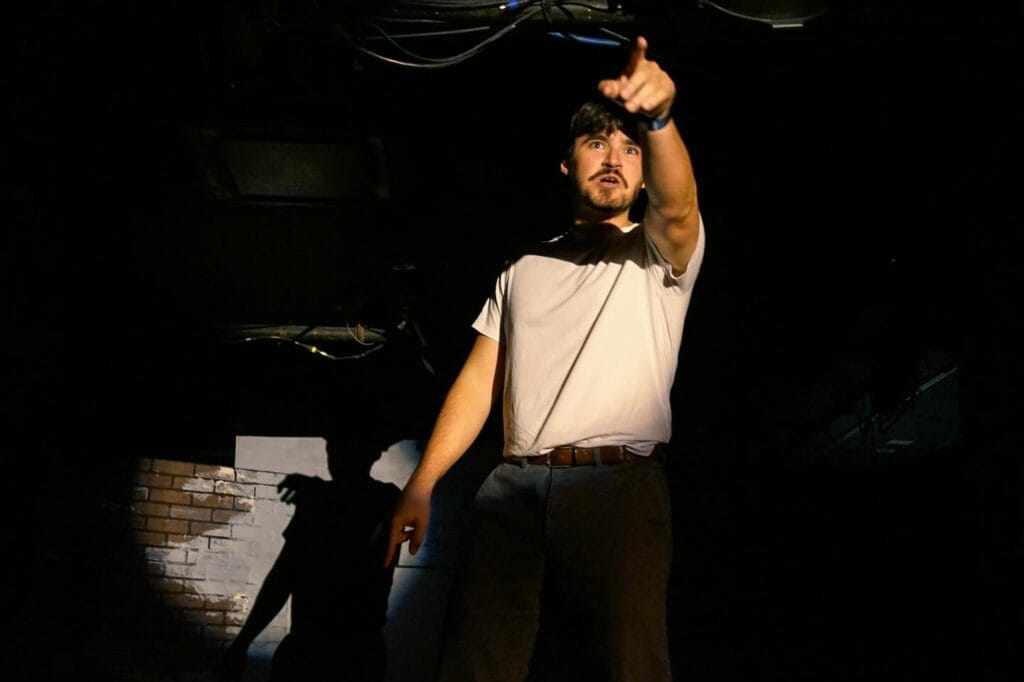
“Three Scenes in the Life of a Trotskyist” examines politics, literature, and the corrosive power of success in America. The “Scenes” trace the forty-year trajectory of Lev Trachtenberg – from an idealistic, Trotskyist student activist to politically entrenched, establishment conservative.
Scene 1: We first meet Lev in 1939 as a leftist firebrand student leader at City College in New York.
Scene 2: It’s 1967 and Lev is now a professor at Columbia University who finds himself on the other side of picket lines during 1960s campus protests.
Scene 3: By 1980, Lev has attained a prominent government position at a Think Tank for the Reagan Right. This horrifies his one-time comrades, who wonder: Has Lev abandoned his old ideals, or has he held on to them too tightly, while the world around him has changed?
Upon entering the theater, we are met by early revolutionary songs like “The Internationale” and “We Shall Overcome” that set the tone. Later, between scenes, there are snippets of radio news by broadcast giants like Walter Cronkite. (Just-right minimalist scenic design for the blackbox space is by Tyler Regalado, with dramatic lighting by Leonardo Urbina and sound by Alex Tarradell. Costume designer Erin Proctor supplies appropriate dress for the actors in the three timelines.)
Scene 1 opens to a sparsely furnished, exposed brick alcove above City College’s cafeteria where we see Daniel (Garrett Colon) stretched out ominously on the floor. No, he’s not dead, just asleep, having arrived hours early for a Trotskyist meeting. Finally, the club’s leader, Lev (Samuel Krogh), enters bearing leftover pastrami sandwiches from the local deli which he shares while explaining that their debate get-togethers tend to start at 1 am – “when there’s nothing left to do but argue.”
I admit to getting off on all the “arguing.” The Trotskyists, like their leader, appear to be mostly Jews who hold the pleasure of fierce argument in their blood. Countless generations are bred and schooled in heated and opinionated Talmudic argument; it’s the Orthodox Jew’s sport of choice – with all participants and spectators welcome. May the most sagacious win! The prize is public esteem, and if one is a young unattached male, the most eligible and attractive bride. For our play’s attendees, simply keeping up with the lightning-fast arguments between red bandana-wearing, Communist Party Stalin-supporter Ben (Richard K. Weber) and incensed Trotskyist Lev is a mind-sharpening exercise like no other. Their reward is to recruit freshman Daniel to their side.
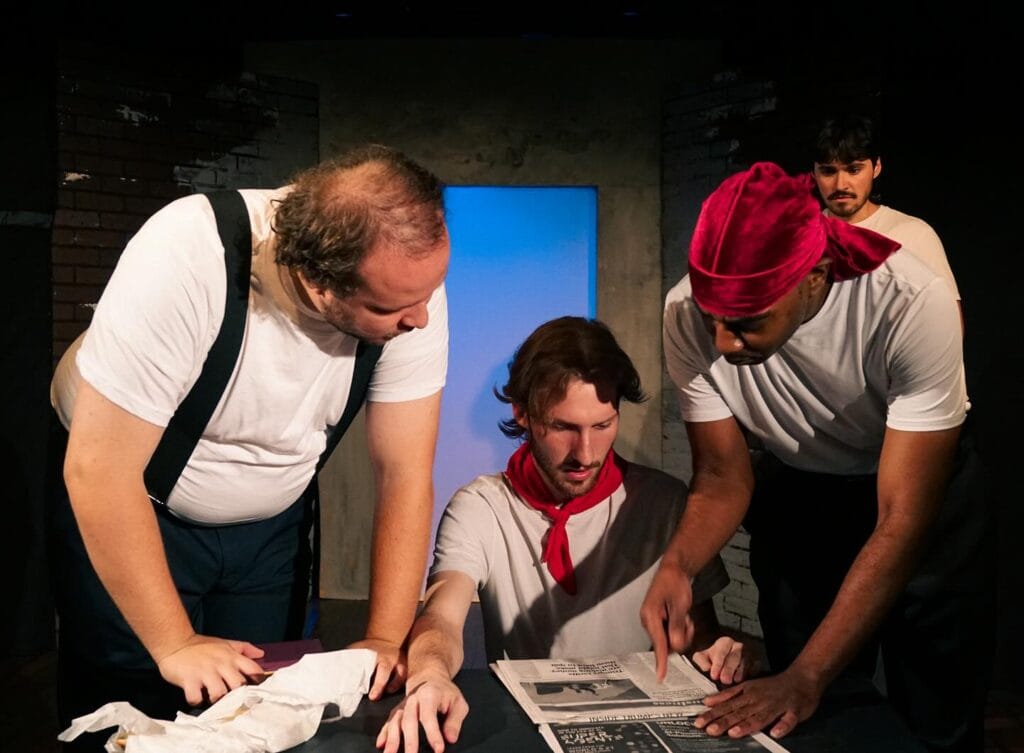
Poor Daniel – who’s studying to become a lawyer in hopes of not being too late to get emigration papers to help as many Jews as possible escape the Nazis (including his family in Poland) – is traumatized at being forced to choose. He leans toward Stalin as the more expedient choice when Ben asserts: “Fascism is spreading across Europe like a cancer, the democracies are complicit or worse, the Jews of Europe are being hounded like criminals, and nobody bats an eye! Who can stop them but Stalin, the man of steel, Stalin, the embodiment of the hopes and dreams of the world working class.”
But then Daniel recites a lengthy list of presumably innocent men, all targeted and killed by Stalin, the avenging dictator. And Lev counters with this. (Be forewarned: the following may cause all-too-recognizable shivers.)
Lev: “These are just the facts, comrades. In 1932, Trotsky warned that Hitler had a real shot at taking power, and that the only thing that could stop him was a workers’ revolution. At the same time, Stalin encouraged Hitler’s rise! Let him into office, he’s a buffoon anyway, then after he loses re-election, it’ll be our turn. To which Trotsky said, obviously, there won’t be an election after Hitler! What stupidity! What ignorance! How could Stalin think such a thing!?! I’ll tell you how: because Stalin is less afraid of Hitler than he is of his own working class!”
As for the “show trials” of Stalin’s enemies, when Daniel asks what they’re for, Lev responds: “The show trials aren’t meant to alert the populace to the threat of imperialism or Trotskyism or fascism. They’re not even meant to intimidate the other members of the Party elite!”
When Daniel next asks, “Then what are they for?” Lev says, “To show the Russian people that Stalin rules unchecked by anything, even Truth itself!” OK, now my “recognizable shivers” have turned to ice.
As if to solidify the Stalin danger for anyone still on the edge, CP member Paul (Warren Welds) bursts in, holding The New York Times and bringing news of “a great tragedy.” He reads: “Germany and Russia Agree on Non-Aggression.” Stalin had signed a treaty with Hitler and the horrified comrades are suddenly united in their need to race to the wastebasket and throw up. Followed by cleaner Louis (Pete Rogan) picking up tossed papers and trash while shaking his head at the kids whom he repeatedly asked: “As an act of working-class solidarity, can you clean up after yourselves?”
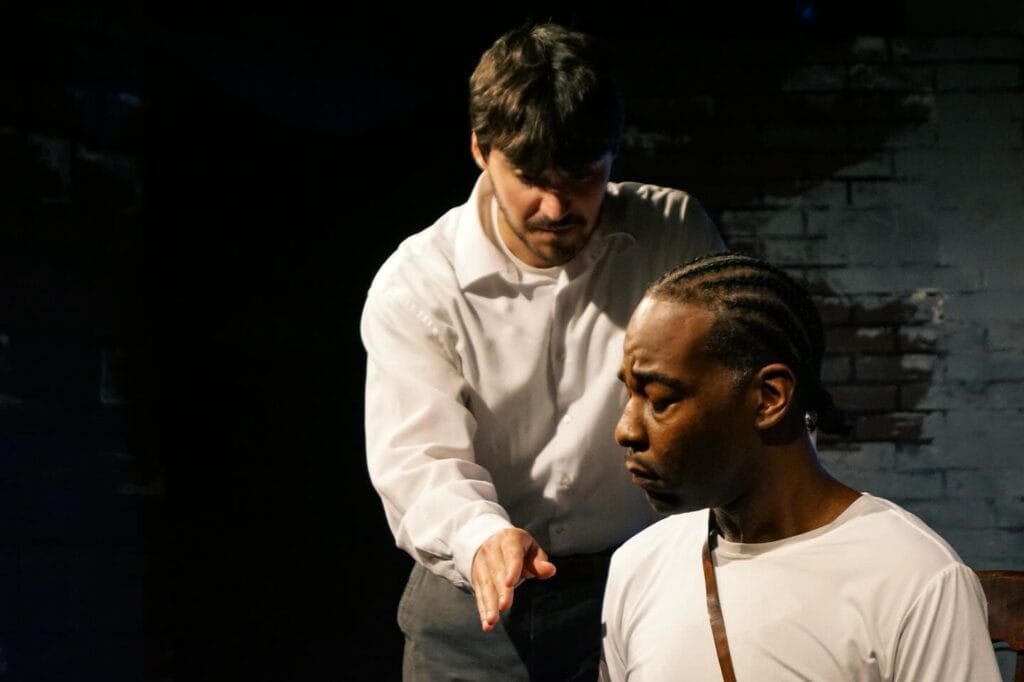
Scene 2, almost three decades on, features a rather smug Lev as tenured Professor of Modernist Literature at Columbia. He’d advocated opening the school to disadvantaged minorities by giving them scholarships. But when confronted by the harsh realities of a Black student’s life – whose values and experiences are radically different from his own – he can’t see past his white privilege and selfish choices. He asks Warren Welds, now in the role of Curtis, to make his argument for a last-minute extension for a due paper (because he was unaware of the unwritten rules of asking for this well in advance).
Curtis explains: “You say you’ve advocated for working class Black students here at Columbia. But it’s not enough just to let us in the door. Even with the scholarship, I still work two jobs outside of school. I pay part of the rent on my parents’ apartment. My mom asks me for help and my dad winces like he does when he climbs the stairs, but there’s nothing they can do. They need the money.”
Curtis doesn’t have the literary background to understand the course’s modernist selections like Elliot’s “The Wasteland,” Joyce, and Pound (writers Lev describes as playing with the language) and thought “modern literature” meant novels like his high school’s “The Great Gatsby.”
Curtis had joined a group of Black students petitioning for English Lit teachers to include at least one Black author in their classes – respected names like James Baldwin, Langston Hughes, Gwendolyn Brooks. Writers they can relate to. But Lev remains adamant in his opinion that oppressed peoples have always been too busy trying to survive to create great works of art and is sticking with his established modernist curriculum.
It’s also sad to see these natural allies argue about what’s worse: Slavery and its ongoing repercussions or the Holocaust and centuries of antisemitism. And while, historically, Jews have often fought for, and marched with, Blacks (as did Lev), in this case, Lev’s conservative intellectualism trumps any human compassion.
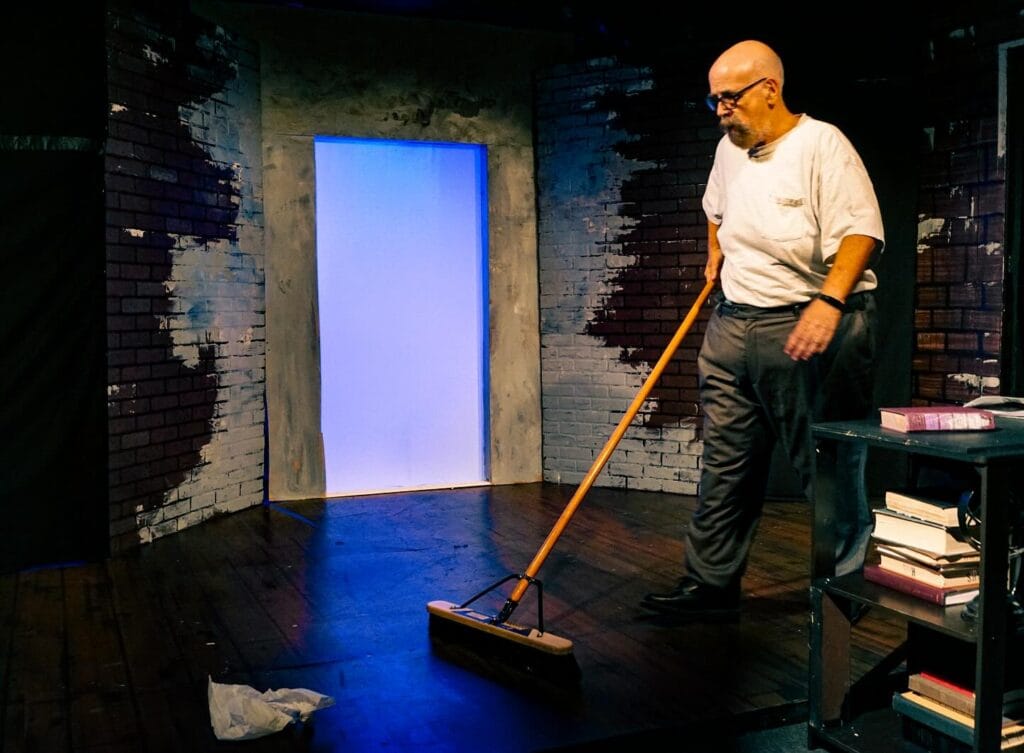

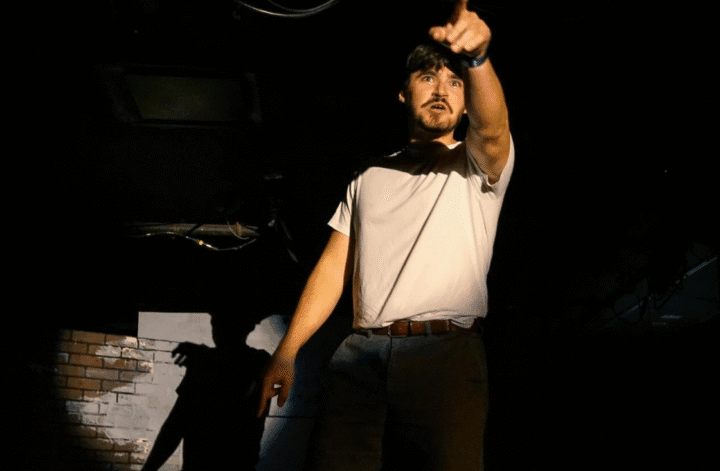
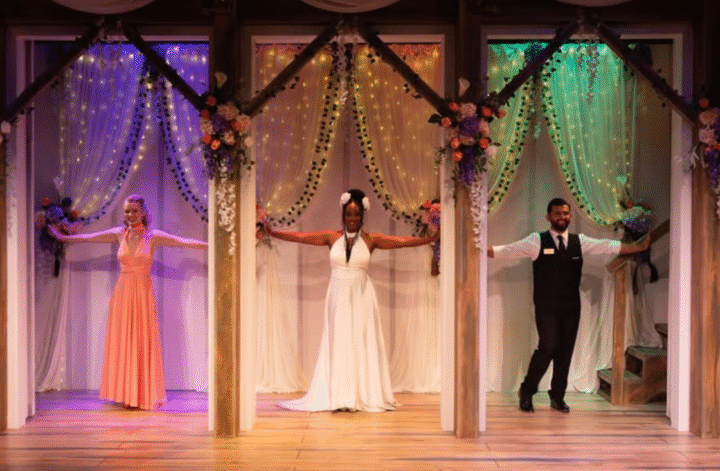
1 comment
virtual mobile phone number australia https://virtual-local-numbers.com/countries/65-australia.html